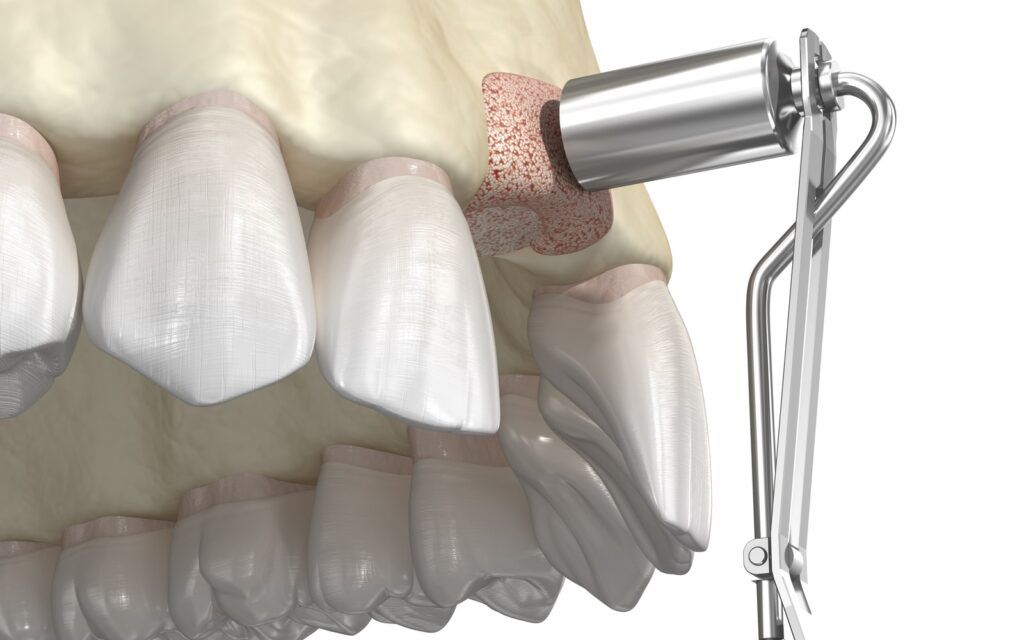Dental implants have revolutionized restorative dentistry by providing a highly effective solution for replacing missing teeth. However, some people experience inadequate bone support, making them ineligible or unable to receive dental implants normally. In these cases, an additional procedure called bone grafting is needed. Understanding the relationship between dental implants and bone grafting is essential for making an informed decision about oral health. At Tulsa Precision Dental, we specialize in comprehensive dental care, and in this article, we’ll explore dental implants and bone grafting to help you make the right choice for your smile.
What Is Bone Grafting and How Does It Improve My Oral Health?
Bone grafting is a surgical procedure that works to augment and rebuild the jawbone when there isn’t enough bone mass or bone quality to support dental implants. During the procedure, the bone grafting material is placed in the defective area, and the grafting material is often sourced from the patient’s bone, donor bone, or synthetic bone. Over time the grafted material integrates with your natural bone through osseointegration, creating a stronger foundation for a dental implant procedure.
So, why is having adequate bone structure important for your oral health? Your teeth rely heavily on your jawbone to be stable and functioning, allowing you to chew and speak easily. The implant post and anchor need a stable structure when you require dental implants. Otherwise, the procedure itself needs to be revised. Inadequate bone structure can cause health problems later in life, including TMJ disorder, bruxism, and other potential complications. Bone graft addresses these issues by providing additional bone mass and improving oral health and the chances of successful implant integration.
If you’re considering dental implants after a bone grafting procedure, then you should be aware of the benefits and risks of either of these procedures in tandem so you can make the right decision. Some of the factors that should be considered include:
- Adequate Bone Support: When it comes to a successful dental implant procedure, having sufficient bone support is vital to anchor the implant securely. Without adequate bone density, the implant may fall out or fail to integrate properly. An unstable implant not only defeats the purpose of protecting your oral health but also compromises the overall success of the procedure. Fortunately, bone grafting significantly addresses this issue by improving the chances of successful implant placement.
- Stability and Functionality: Combining a dental implant procedure with bone grafting offers several benefits, including improved stability and functionality of your mouth. You can experience enhanced oral health and improved chewing capabilities by undergoing these procedures together. This means you can enjoy the confidence of a stable and functional set of teeth.
- Jawbone Stimulation: Bone grafting and dental implants stimulate the jawbone, which prevents further bone loss. When a tooth is lost or extracted, the jawbone can deteriorate over time. However, with the implementation of bone grafting and dental implants, the jawbone is stimulated and encouraged to maintain its health. This helps to prevent additional bone loss, preserving the structure of your jaw and supporting long-term oral health.
- Preserve Your Natural Beauty: Another important benefit of combining bone grafting with dental implants is preserving jaw features. Jawbone deterioration can lead to changes in your facial structure, affecting your ability to chew and speak properly. By undergoing these procedures together, you can restore your jaw’s natural features, allowing you to regain optimal oral function and maintain your unique facial aesthetics.
The decision to proceed with dental implants after a bone grafting procedure is highly individual and should be made in consultation with an experienced implant dentist or oral surgeon. At Tulsa Precision Dental, our team of professionals will carefully evaluate your specific case, considering factors such as the quality and quantity of existing bone, the success of the grafting procedure, and your overall oral health and medical history. We can recommend you to specialists who work with bone graft procedures, explaining the potential risks and benefits and assisting you in determining the best course of action to achieve your desired outcomes.
Visit Tulsa Precision Dental For an Implant Consultation and Cleaning!
When considering dental implants after a bone grafting procedure, weighing the benefits and consulting a dental professional are crucial. Addressing inadequate bone support through bone grafting can significantly increase the chances of successful dental implant placement, restoring your smile, improving oral function, and boosting self-confidence. At Tulsa Precision Dental in Tulsa, OK, we are committed to providing personalized care and utilizing the latest techniques to help you achieve a healthy and beautiful smile. Contact us today by calling (918) 492-1917 to schedule a consultation with Dr. Chris and Kristie Vinson and embark on your journey to optimal oral health with dental implants and bone grafting.



